by Adnan Tabatabai
Iranian President Hassan Rouhani arrived in New York yesterday with the clear understanding that he’s being carefully watched back home. The official purpose of his trip is to address the United Nations General Assembly, but much more is at stake. Rouhani made solving the conflict over Iran’s nuclear program the centerpiece of his presidential campaign, but while the Nov. 24 deadline to reach a final accord is steadily approaching, no deal is in sight. Meanwhile the president of the United States—essentially Iran’s main negotiating partner in the talks—is facing growing pressure to develop a coherent strategy against the radical militia that calls itself the Islamic State (ISIS or ISIL). The course of the next few months could define both leaders’ presidential legacies.
No matter how you look at it, resolving both these issues requires a modus operandi between Iran and the United States. Bilateral talks between the two long-time adversaries have almost become routine over the last year; the latest meeting between Iranian Foreign Minister Javad Zarif and US Secretary of State John Kerry lasted for more than an hour Sunday in New York. But the debate over the definition of a “functional relationship” with Washington is among the most sensitive issues in Iran with competing political factions exercising extreme skepticism against each other.
Iran’s Supreme Leader Ali Khamenei is (and has always been) trying to cover all his bases: those backing the Rouhani government’s path towards constructive engagement, and those for whom rapprochement with the US is a red line.
Last week, an infographic published on the ayatollah’s website illustrated why talks with the US in the past 12 months have been harmful to Iran. Two days later, a compilation of quotes by the Supreme Leader supporting the negotiations was published on the same site.
Critics Seek Center Stage
Some of the Rouhani government’s most outspoken opponents convened on Monday for yet another press conference in Tehran to voice their concerns about Iran’s foreign policy. Since May this year, these hard-line conservative MPs, clerics and think tankers—also known as “the concerned” (delvaapasaan)—have routinely set up meetings whenever a new round of nuclear talks is taking place between Iran and the permanent members of the UN Security Council plus Germany (P5+1).
Through lectures and a Q&A session with journalists, the panelists of the “Path and Pit” meeting outlined the “dos and don’ts” for Rouhani’s trip and warned against yet another “inappropriate action”—their reference to Rouhani’s last-minute telephone conversation with US President Barack Obama during last year’s UNGA.
The concerns identified by the delvaapasaan are based on a variety of issues that extend far beyond the nuclear negotiations. The group mainly criticizes the Rouhani government for:
- Abandoning resistance as the main theme defining foreign affairs
- Leaning towards appeasement vis-à-vis Washington
- Selling out Iran’s right to scientific progress in the nuclear talks
- Falling short of informing the parliament about the nuclear talks
- Not allowing a critical debate about their foreign policy in the media
- Not following the path outlined by the supreme leader
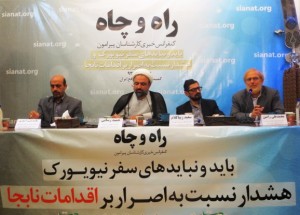 Panelist Mohammad Hassan Asafari, a member of the parliamentary Committee for National Security and Foreign Affairs, credited Iran’s “strong” position in the region to its policies of resistance and expressed worries about Rouhani’s approach to ending the sanctions regime. “We should not show the enemy that we are eager for the sanctions to be lifted,” he said. “It would pave the way for the enemy’s benefit if Iran looks too keen.”
Panelist Mohammad Hassan Asafari, a member of the parliamentary Committee for National Security and Foreign Affairs, credited Iran’s “strong” position in the region to its policies of resistance and expressed worries about Rouhani’s approach to ending the sanctions regime. “We should not show the enemy that we are eager for the sanctions to be lifted,” he said. “It would pave the way for the enemy’s benefit if Iran looks too keen.”
Hamid Rasai, a MP and leading member of the hard-line Endurance Front who got one of Rouhani’s ministers impeached, argued that direct talks with the United States have not only resulted in no benefit but also been followed by harsher rhetoric from Washington and additional unilateral sanctions.
Rasai also stressed that “Rouhani should know he is the president of the Islamic Republic, not just the president of the people of Iran.” He must therefore seize the opportunity provided by the UNGA “to spread our message to the world”—which former President Ahmadinejad managed to do, according to Rasai.
Mohammad Ali Ramin, a former deputy minister under Ahmadinejad, argued that the group is not only concerned about the nuclear issue but also about the broader picture in which the supreme leader is the Imam of the global umma (community) and not just the Iranian nation. Rouhani should therefore recognize that he is “administering just a corner of that umma” and consider the leader’s viewpoints, said Ramin.
The last speaker in the group, University of Tehran Professor Saeed Zibakalam, said he expects the Rouhani government to whitewash Washington’s position towards Iran, and criticized the negotiating team for substantially exaggerating the benefits of the Joint Plan of Action reached in Geneva last year. The plan does not acknowledge Iran’s right to enrich uranium and no sanctions were lifted, argued Zibakalam.
Asked by journalists to identify the difference between the current and previous administration on Iran’s nuclear file, Rasai said that under Ahmadinejad, the nuclear issue was taken care of by the Supreme National Security Council, whereas now it is processed in the Ministry of Foreign Affairs where it is under the scrutiny of “no one but Rouhani”.
Rasai further complained about state media being controlled by a government that he said prevents critical debate and criticized other media for promoting rapprochement with the United States. Rasai even asked a journalist from the reformist daily Etemad why his paper is “waiting for Rouhani to have a meeting with the Satan.”
Rasai and Zibakalam both agreed that the Iranian people would not accept bowing down to the US and would oust any president who attempted to do so.
Political Realities
The meeting was yet another indicator that criticism of Iran’s foreign policy goals has reached a new peak on the home front.
In recent days, far-right conservative outlets like Fars News, Kayhan, Vatan-e Emrouz and Raja News ran features and op-eds warning against the acceptance of a nuclear deal limiting Iran’s uranium enrichment and any rapprochement with the United States.
Indeed, almost immediately after it was reported by the New York Times, public opposition was voiced in Iran to a “face-saving” proposal that would allow Iran to keep its centrifuges in place but suspend operations. “This proposal is ridiculous…If such a proposal is formally presented by American officials, it indicates their childish outlook on the negotiations or the stupid assumptions of the Iranian side,” said Hossein Sheikholeslam, a deputy to the speaker of parliament, according to Fars News.
As I wrote two months ago, the Rouhani administration is not desperate for a deal—especially not one that would be difficult to sell at home.
A recent poll suggests that more than 70% of the Iranian public would not accept a deal that forces Iran to dismantle up to half of its operating centrifuges and limit its nuclear research capacities. A large majority of Iranians also believe that their nuclear program is just an excuse for foreign powers to exert pressure on Iran, according to the poll.
Regardless of whether or not the survey’s methodology is reliable (accurate polling is hard to come by when it comes to Iran), the overall results reflect what one would hear and read in Iran.
While hope persists, we should not expect another big step with regards to US-Iran relations during Rouhani’s trip to New York this year—no phonecall, no handshake, and no joint press conference.
Even if there were a political breakthrough—which seems unlikely at this point—the timing isn’t right. Such political staging would result in harsh political blowback in Washington and Tehran for both presidents.
We should therefore expect the nuclear talks as well as any debate on fighting ISIS in Syria and Iraq to be conducted in a private and prudent fashion.
Meanwhile, Iran has been making history with other world powers. The meeting today between Rouhani and French President Francois Hollande was widely publicized by both countries. The expected meeting between Rouhani and British Prime Minister David Cameron would be the first of its kind in 35 years.
Iran’s international outreach should not be interpreted as solely bent on rapprochement with the United States. In this light, Rouhani has a lot to gain from his second visit to New York deal or no deal.
Right now, meeting w/ the President of #France @fhollande re expansion of bilateral ties. #ConstructiveEngagement pic.twitter.com/1QxwADd26e
— Hassan Rouhani (@HassanRouhani) September 23, 2014


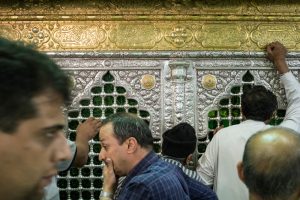
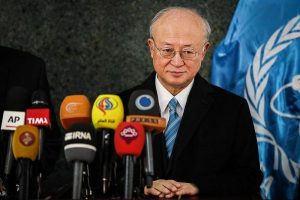
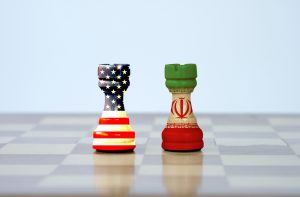
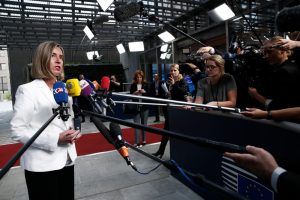
So both side have their own version of Neocon. Too bad there isn’t an instant medical remedy to cure that.
Al-Nusra and ISIS and their terror associates are the two prominent forces on the ground in the ranks of the Syrian opposition. Push back of these forces will require someone’s boots on the ground to hold what has been vacated. US plan to train and arm the “moderate forces” that may or may not be ready to fight in 2016 is not a workable strategy according to many observers. The well spoken, clean shaven leader of the moderate opposition is a reminder of Chalabi days!
Even though US and its European allies are solidly with the Sunni Arab nations in the “coalition”, none has the means and capabilities to fight a sustained ground war, the kind in Syria seemingly. Turkey, a none Arab, is the only other country capable of coming in and putting boots on the ground, for its own reasons, it refuses to get engaged more than they have been. This leaves the Assad army, Hizbolah fighters and other Shia militia with the backing of Iran the only boots on the ground that have been holding the line against these terrorists for the past two years. Yet, they have been all excluded from discussions, at least formally. The question to ask over here is how the coalition intends to eradicate ISIS? Who will go and evict them from land they already have incorporated in their Emirate in the Levant? Who?
It seems linking the nuke negotiations and ISIS in a give and take with Iran, which is the force capable of dealing with at least a major portion of ISIS issue, is now taboo! Yet, everyone is in search and thirsty for a “deal”! When US and its European allies on behest of Persian Gulf Arabs mainly and Israel, have already poisoned the well. If there is no give, then there wont be any take!
It seems the political environs of DC leadership lack the vision and have to an extent demonstrated the fortitude to see beyond November and to take a stand against this torrent of foreign interference in our foreign policy and in effect preservation of our national interest. Instead of United States defining what it will be for our dependent allies, it has been hamstrung by their lobbying and their efforts to benefit their own national interests.
A lot of folks should be wondering where it will all end for us!
At least there is finally recognition that the obstacles to a nuclear deal lie with Iran, especially with Khamenei’s steadfast opposition to any weakening of its refining infrastructure and delivery systems. Unlike the media hoopla and shout outs to American Jewish voters last year, Rouhani all but arrived in NYC trying to tamp down expectations and reset the bar lower amid the realities of an unstable world where Iran is now hip deep in bloody sectarian conflicts in Gaza, Iraq and Syria with no end in sight. Far from the hopefulness of last year, Rouhani is beset with a domestic situation that is arguably worse than when he took office. The future does not look any brighter now that economic sanctions look to continue and Iran’s leadership remains intractable.